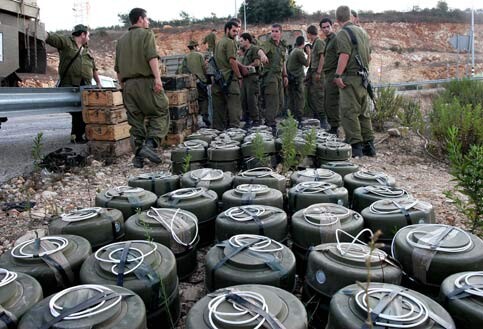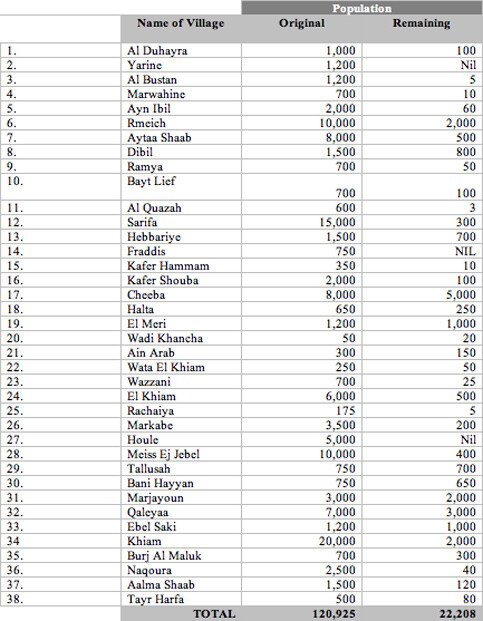UN Office for the Coordination of Humanitarian Affairs 8 August 2006

Israeli soldiers prepare land mines before advancing into southern Lebanon from northern Israel, 2 August 2006. (MaanImages/Moti Milrod)
The following information appeared in the report entitled: “Lebanon response OCHA situation report No. 12”, from 4 August 2006.
Key developments
Road Corridor from Syria Disrupted
Overnight Israeli strikes on the highway and bridges on the route from Aarida to Beirut has currently halted the overland delivery of essential UN humanitarian goods and emergency personnel. The highway is considered a primary humanitarian access route.
In order to re-start the flow of relief supplies, the UN is already working to shift the focus of transportation of humanitarian supplies from land to sea. As such, the humanitarian hub in Cyprus will key with regards to receiving humanitarian assistance from abroad and dispatching it to the ports of Beirut, Tyre and Tripoli. However, these arrangements will take a few days to regularize and make fully operational.
The UN will also undertake an assessment of the damage done to the Aarida-Beirut road and review as to whether alternate land routes can be used. However, the UN is concerned that alternative road routes may not support WFP’s heavy tonnage trucks.
Situation Overview
1. The Government of Lebanon’s (GoL) Higher Relief Council (HRC) today reports that 907 people have been killed and 3,293 people have been injured due to the on-going conflict. The HRC also reports that 913,760 people (of which almost half are children), about one-quarter of Lebanon’s population, have fled their homes. Most of the displaced are said to be located in South Beirut, Tyre (Sur), Sidon (Saida), Chouf, and Aaley.
2. Although an estimated 565,000 displaced persons are staying with relatives and friends, the HRC estimates 128,000 are located in schools and public institutions in Lebanon, and 220,000 have fled to neighboring countries, including 150,000 to Syria. Ongoing insecurity in Lebanon, however, continues to prevent relief agencies from accurately assessing the growing number of people affected. Tens of thousands of Third Country Nationals (TCNs) from about 20 countries continue to remain trapped in Lebanon.
3. Ongoing assessments of villages from south of the Latani River continue to indicate widespread population movement. Of those villages surveyed, only 19% of the original population remained.
Population

4. According to UN reports, current food supplies delivered to southern Lebanon are enough to feed 80,000 people for a week. However, tens of thousands of people remain trapped in the region with limited outside assistance, while fighting continues around them. They are in urgent need of food, clean water, medical supplies, fuel and shelter.
Security
5. Security Phase IV remains in place across the country. In Syria, Security Phase II exists at the main entry point into Syria and along the border with Iraq, while the rest of the country is under Security Phase I.
6. The UN’s Department of Safety and Security (DSS) in Beirut advises that in view of the destruction of the coastal road and upon information received from the IDF all movement between Beirut and Aarida has been suspended until further notice.
7. Heavy exchanges of fire continued unabated throughout the UNIFIL area of operation.
8. The IDF has maintained their presence and continued to operate in the following areas inside Lebanese territory: between the villages of Al Duhayra and Ayta Ash Shab in the western sector, and between the villages of Yarun and Sarda in the central and eastern sector. Intense shelling and exchanges on the ground were reported in these areas, including the urban areas of Al Duhayra, Tayr Harfa, Ramyah, Ayta Ash Shab, Markaba and Tayyabah.
9. A UNIFIL convoy came under small arms fire in the area of Markaba yesterday evening, causing damage to an armored personnel carrier. It was also reported that Hezbollah fired rockets from the vicinity of two UN positions in the area of Alma Ash Shab and At Tiri.
Humanitarian Response
10. Only one of the two planned convoys managed to proceed (to Jezzine) due to overnight bombardment in the suburbs of South Beirut. The convoy planned for Tyre and onward to Rashidiyeh did not go ahead as the truck drivers were unable to leave their apartments.
11. An ICRC convoy stuck in Marjayoun has reached its destination. The convoy carried 3,000 meals ready to eat (MRE), 500 blankets and 200 tarpaulins to the Lebanese Red Cross (LRC) in Hasbaya, to be distributed to displaced person and host families in surrounding villages (Ebel Es Saqi, Kaoukaba).
12. UNJLC is currently establishing a road condition reporting system that will be shared among humanitarian agencies by the end of the week. The system will allow for the publication of regular road condition report maps and reports.
Logistics
13. The first Logistics Cluster Meeting took place yesterday in Cyprus with UN agencies, NGOs and embassy representatives. It was noted NGOs should submit their requirements for cargo transport by email to UNJLC at lebanon.cargo@unjlc.org. Details of procedures and Cargo Movement Request forms are available at www.unjlc.org/lebanon. Presently, no passenger transport is available between Larnaca and Beirut either from WFP-UNHAS or ICRC. UN agencies and NGOs are also requested to submit their pipeline information to UNJLC to cyprus@unjlc.org, even if the data is not yet precise. This information is used for the planning and funding of cargo transport for all aid organizations which require it. Pipeline forms are available at www.unjlc.org/lebanon. The next meeting will be held on Wednesday August 10.
Health/Nutrition
14. The Lebanese Ministry of Health (MoH), supported by WHO and UNICEF, have had to suspend their campaign to immunize tens of thousands of displaced children because of the overnight bombing
15. The third Health Cluster Meeting was convened today by WHO in. It was agreed that: psychosocial support will be organized jointly between WHO and UNICEF; and WHO will rent another warehouse for incoming donations.
16. The Nutrition Sub-Cluster Meeting brought together the Lebanese Pediatric Society, Lebanese Nutrition Society and ACF. A consolidated action plan to address nutritional needs will be presented on Monday.
Food
17. WFP has so far received 1,820mt of food commodities through local and international purchases (wheat flour, canned meat, biscuits and vegetable oil) for Lebanon. Another 2,734mt of food commodities are expected to be available by 10 August. In Syria, some 800mt of food commodities have been/are in the process of being procured.
18. Ten metric tons of WFP high energy biscuits (HEB) and 2mt of other essential supplies departed from the UN Humanitarian Depot in Brindisi, Italy, aboard a C-130 Hercules aircraft for Larnaca. The aircraft is expected to conduct four rotations between Friday and Monday, delivering a total of 42mt of WFP HEBs, 4mt of medical supplies for WHO, as well as other urgently-needed relief supplies.
Shelter/NFI
19. UNDP distributed NFIs to the Makassed Schools that serve 15 centers with 3,500 IDPs in Beirut. The supplies are: 11 Boxes of Cerelac, 80 Boxes of Kotex, 15 Hygiene kits and 15 Kitchen Kits. UNDP distributed NFIs to the Islamic Health Association serving 50 centers with 10,000 IDPs. The supplies are: 30 Boxes of Cerelac, 30 Hygiene Kits, 30 Kitchen kits, 30 boxes of diapers.
20. UNHCR and its partners (including the GoL) are developing a tented camp for 800-1,000 displaced people at an old railway depot in Beirut’s Furn El Shabak district. UNHCR has also distributed more than 6,200 blankets, several tents, 54 kitchen sets and 3,380 mattresses to nearly 5,000 people in Lebanon.
21. UNHCR is working closely with the Syrian Arab Red Crescent providing relief items for distribution: 1,000 tents, 13,460 mattresses, 13,000 blankets, 1,500 plastic sheets, 2,366 kitchen sets and 1,000 kerosene stoves have been distributed or are being stored in warehouses for immediate assistance to refugees, asylums seekers and others in and around Damascus, Homs, Tartus and Aleppo.
22. ICRC distributed three trucks of relief items to villages located in the vicinity of Tyre. An ICRC team is carrying out a humanitarian assessment mission in villages of Marjayoun and Zahle.
Other
23. UNDP will undertake a national assessment mission on 8 August that will include the oil spill and other key acute environmental issues.
24. Specialists from Telecoms Sans Frontieres (TSF) have arrived in Larnaca, Cyprus and waiting for permission to enter Beirut. TSF will be carrying seven satellite lines, three satellite data transmitters, one audio-visual conference station and IT equipment such as laptops, fax, printers, scanners and photocopiers. When security conditions are met, TSF will deploy mobile Telecoms Centers with wireless Internet access that will be made available to the humanitarian community in southern Lebanon. In parallel, TSF will provide telephone services for displaced populations.
25. Catholic Relief Services (CRS) and Caritas Lebanon have aided 85,530 displaced people throughout Lebanon. The agencies say they hope the numbers of those aided will soon increase to between 130,000 to 140,000.
26. The Director of Caritas Lebanon stated on Wednesday that “basic food and relief items can no longer be procured from within this country. What little is left on the market is being sold at exorbitant prices, so we have had to purchase supplies in neighboring areas.”
Funding
27. According to OCHA’s Financial Tracking System (FTS), over US $36 million has now been made available to agencies against the UN/NGO Flash Appeal. Another US $25 million has been pledged. For the latest funding requirements, contributions, and list of projects, see the FTS on http://www.reliefweb.int/fts
Related Links